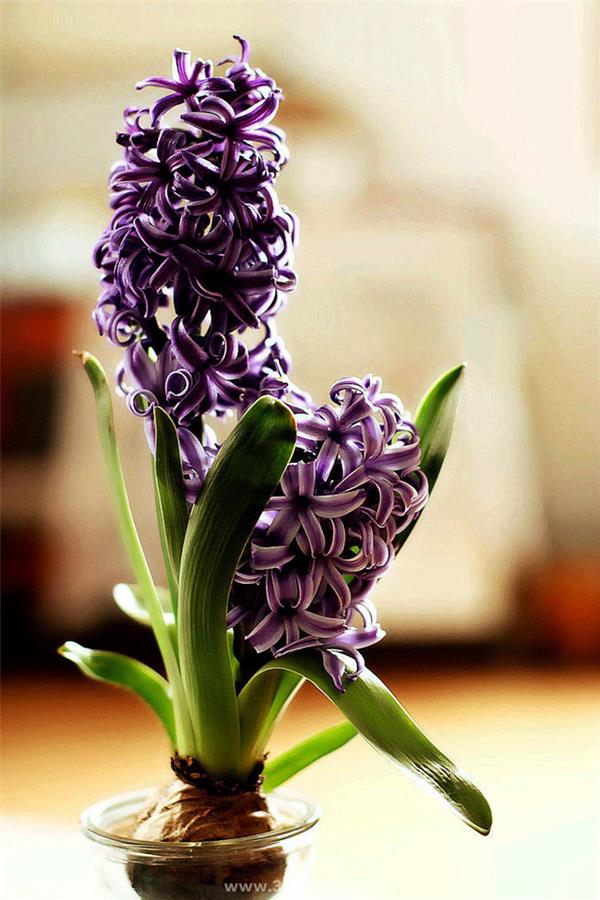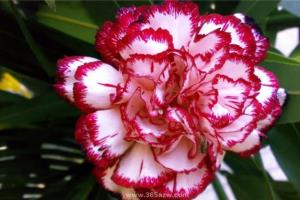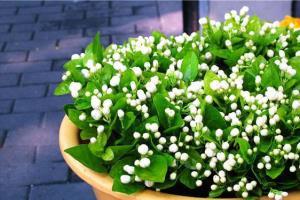Planting method of hyacinth

Planting method of hyacinth
Split the ball
After the bulb was dug back in June, the big ball and the seed ball were separated. "the big ball can blossom in early spring next year after autumn planting, and the seed ball needs to be cultivated for 3 years before it can blossom. Due to the low natural ball division rate of hyacinth, the mother plant can only divide 1-2 bulbs after planting for one year. In order to improve the reproduction coefficient, castration can be used to stimulate the bulbs to grow in the summer dormant period.
Sowing seeds
It is often used in the cultivation of new varieties, sowed in the culture soil in the cold bed in autumn, covered with 1 cm of soil, and germinated at the end of January and the beginning of February of the following year. Bulbs cultured from seedlings blossom after 4-5 years. Under general conditions, the germination ability of seeds can be maintained for 3 years.
Field management
Selection and purchase
The nutrients needed for hyacinth flowering are mainly supplied by the nutrients stored in the bulbs and leaves. As long as we choose the bulbs that have no damage to the epidermis, fleshy scales are not too wrinkled, hard and heavy, and full, we can produce rich and beautiful flowers. In the selection and purchase of seed heads, we should pay attention to the selection of bright skin color, strong texture, no disease spots and insect population is good, usually from the color of the seed coat can basically judge what color of flowers it is.
For example, if the skin is purplish red, it will have purplish red flowers, and if it is white, it will have white flowers, but some hybrid varieties will have a more complex color, and sometimes they will not be able to distinguish clearly, so they need to ask the operator to buy. When the seed head is bought back, soak it with carbendazim and dry it. In order to break the dormancy period, it should be refrigerated in the bottom compartment of the refrigerator for about a month so that it can blossom smoothly in the future. But when you take it out of the refrigerator, it is best to put it in a cool place for seven or eight days before sowing.
Soil
Hyacinth should choose sandy loam with good drainage and not too dry, which requires fertile soil, high content of organic matter, good aggregate structure, neutral to slightly alkaline, pH 6-7. The culture soil can be prepared according to the ratio of rotten leaf soil 5 ∶ garden soil 3 ∶ coarse sand 1.5 ∶ bone powder 0.5. Before planting, chemical agents such as formalin can be used to cover the soil surface immediately after applying formalin at a soil temperature of 10-15 ℃. After 3 days of warm weather, remove the film and plant it after 1 day to keep the soil moist. Before planting, we should apply enough base fertilizer, cultivate in the field, and avoid continuous cropping.
It is suitable to be carried out from October to November, and the selection of soil with good drainage is the most important condition. Before planting, apply enough base fertilizer, add a thin layer of sand, and then arrange the bulbs, 15-18 meters apart, 5-8 meters covered with soil. And cover with grass to keep the soil loose and moist. Generally, there is no other management before flowering. If seeds are not to be collected after flowering, the flower stem should be cut off to promote bulb development. The cutting position should be in the uppermost part of the flower stem as far as possible. The bulb roots can be dug up in early June, spread out and stored in cold storage, and the summer temperature should not exceed 28 ℃.
With loam, rotten leaf soil, fine sand and other mixed nutrition soil, generally 10 meters diameter pot planting a ball, 15 meters diameter pot 2-3 balls, and then buried in the pot, the overlying soil 10 meters-15 meters, after 7-8 weeks, buds grow to more than 10 meters, go to cover the soil to make the sun shine, generally planted in October-November, flowering in March.
Aquaculture
Hyacinth aquaculture requires that the water level should have a space of 1-2cm from the chassis of the bulb, so that the root system can breathe, and it is strictly forbidden to fill the water over the bottom of the bulb. In December, you can put the seed ball in a wide-mouthed glass bottle and add a little charcoal to help with antisepsis and disinfection. The seed ball is only dipped to the bottom of the ball, then it is placed in a dark place and the bottle is covered with black cloth, so that after germinating in an all-black environment for more than 20 days, it is put outdoors to be exposed to sunlight for 1-2 hours a day at first, and then gradually increased to 7-8 hours, most of which can blossom during the Spring Festival when the weather is good.
Select time
After late July, the bulbs were treated with low temperature of 8 ℃ for 70-75 days, then potted in early October and cultivated in greenhouse to make them blossom at the end of the year. As the sensitivity of cultivated varieties varies greatly, the varieties suitable for promoting cultivation should be selected when promoting cultivation.
Light
Hyacinth only needs more than 5000Lx to maintain normal physiological activity. If the light is too weak, the plant will be thin, the stem is too long, the bud is small, the flowers are early, and the leaves are yellow. incandescent lamp can be used to fill the light at about 1 meter, but too strong light can also cause leaves and petals to burn or shorten the flowering period.
Humidity
Soil moisture should be kept between 60-70%, too high, root respiration is inhibited and perishable, and if it is too low, the aboveground part wilts or even dies; the air humidity should be kept at about 80%, and can be increased by spraying and watering the ground. Ventilation and other methods can also be used to reduce humidity.
Temperature
When the temperature is too high, even higher than 35 ℃, flower bud differentiation will be inhibited and abnormal growth will occur.
The phenomenon that the blind flower rate increases; if the temperature is too low, the flower buds will suffer frost damage. At the beginning of the 20th century, flower growers began to produce hyacinth in greenhouses and treat them at a certain temperature. Like tulips and other bulbs, their bulbs need to be maintained at low temperatures for a period of time, otherwise they will not produce high-quality flowers and stems of sufficient length.
The growth process of hyacinth includes a leaf formation stage, a flower formation stage and an elongation stage. Promote the flowering of the bulb by early flower formation and providing the most effective period of low temperature. This is why hyacinths grown in the Mediterranean tend to blossom early. Leaf formation can be accelerated by keeping a higher temperature in the bulb planting stage, so the flower formation stage is also earlier.
Compared with other bulbous plants, hyacinth forms flowers earlier through special temperature treatment. One way to achieve this is to increase the soil temperature during bulb growth. This method is rarely used because of its high cost. More commonly, the bulbs are dug up early and treated with temperature in an air-conditioned room to promote flower formation. The period of excavation and the temperature of treatment are the factors that distinguish potted plants from cut hyacinth.
The period of excavation and the temperature of treatment are the factors that distinguish potted plants from cut hyacinth.
Related
- Wuhan Hospital Iron Tree Blooming Result Was Instantly Frightened by the Gardener Master
- Which variety of camellia is the most fragrant and best? Which one do you like best?
- What is the small blue coat, the breeding methods and matters needing attention of the succulent plant
- Dormancy time and maintenance management of succulent plants during dormancy
- Minas succulent how to raise, Minas succulent plant pictures
- What are the varieties of winter succulent plants
- How to raise succulent plants in twelve rolls? let's take a look at some experience of breeding twelve rolls.
- Attention should be paid to water control for succulent plants during dormant period (winter and summer)
- Watering experience of twelve rolls of succulent plants
- Techniques for fertilizing succulent plants. An article will let you know how to fertilize succulent plants.



